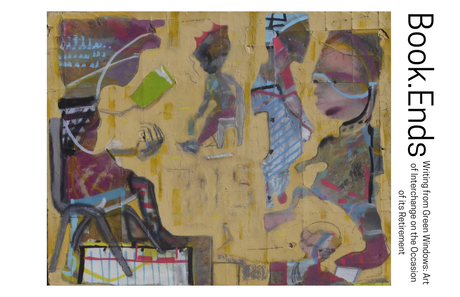 Green Windows has retired, after twelve years!
Green Windows held a Retirement Celebration on June 28, 2020. The evening honored the community that we’ve built over the past twelve years and acknowledged Peggy’s creative guidance and nurturing of our space together. Below are Peggy’s goodbye remarks, partly from her introduction to Book.Ends, and below that, reflections and goodbyes from members of Green Windows’ community. 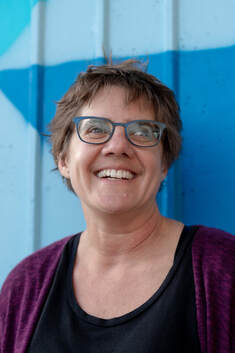 Firstly, there are so many people to thank for the last twelve years!
My own last words are here are an excerpt from my introduction to Book.Ends: After writing in workshops that use the Amherst Writers and Artists (AWA) method since 2004, I realized, in 2006, that the AWA method was a perfect partner for my passion of bringing very different people together, safely and as equals, purposefully with care and intention. In 2007 I was certified as an AWA facilitator. In 2008, I started Green Windows and joined Intersection for the Arts as one of their incubator programs. And in the last twelve years, I’ve facilitated workshops in community colleges, youth centers, schools, community centers, affordable housing complexes, museums, libraries, juvenile halls, nonprofit retreats and for the general public. In these workshops I’ve had teens and seniors, students and teachers, homeless and housed, people with and without degrees and from different corners of Oakland. In 2009, I started a monthly drop-in workshop, sliding scale, finding a perfect host and partner in The Rock Paper Scissors Collective. And with this workshop, I drew my vast network together and people who would not otherwise cross paths wrote together, safely, as equals, each encouraged to be true to their own voice. I’ve only skimmed the surface of what Green Windows has done. I haven’t mentioned the dozens of people who have supported the work in various ways (thank you), or the mentors and mentees who make the work not a paper but a circle. The books, blogs and articles. Twelve years of words given and received. On March 24, 2020, we had the 127th and last monthly workshop. I am ready to shift my energies while deeply grateful for all this time with your words and seeing you listen to and affect each other. And deeply grateful that we made it, together, to this moment, sheltering in place from a pandemic and writing online. Twelve years brought us here, so profoundly needing each other and needing to write with each other that it feels fated. We wrote ourselves to this moment to have community while isolated and surrounded by tragedy and insecurity. Fate bewilders me; I would have never even known to ask for this blessing. And I am grateful. Listen. When I write that I am grateful for this community, I am talking about you. You. Twelve years came to this moment with you all in a Zoom room. And I will leave the room, the moment, the dozen years, with an understanding of people and of words that I did not have before, that I need to navigate the gloomy foggy future. I thank you. And I invite you. I invite you to continue the work. Each morning with your candle, over coffee six feet apart, while walking along the beach, in your dreams, in a secret notebook, I invite you to continue the work of being true to yourselves and of letting the choosing of words, the choosing of images, the choosing of characters, the choosing of plot, the respect of your own rhythms, your own voices, your own language, your own stepping stones into phrases, letting them help you to see what the truths are in yourselves, and by listening for what you like, on the beach, over coffee, in the zoom meeting, to see what the truths are that others’ offer you. I invite you to continue the work. You do not need me, or Green Windows to do it. I believe in you. I believe in your words and, when you let them, the truths they carry for you. - Peggy Simmons Founding Director Green Windows: Art of Interchange 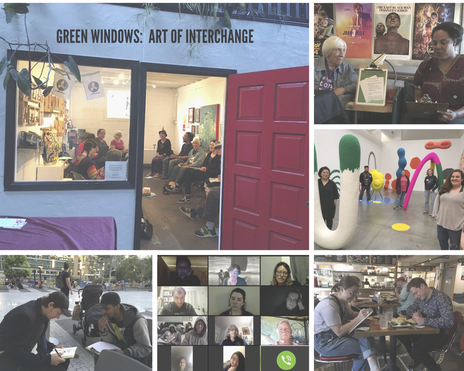 Below are participants’ answers to the following questions: “How will Green Windows live on? How do you bring what you have learned, experienced and created with GW into your life and the world? Consider your artistic practice, sense of community, how we relate to each other, and how you see the world around you.” 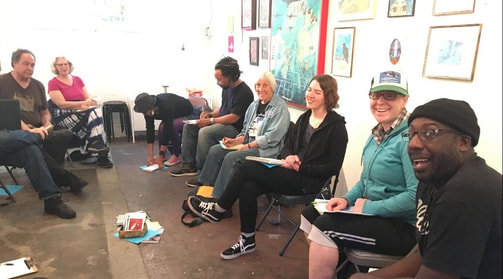 My view of the world has expanded from what I consider a creative collaboration with other people, their writing styles, backgrounds, points of view. Careful, close listening skills, appreciation for words and phrasing, intended communication and subtle messages - all these attributes have been enhanced in myself and I dare say everyone else who has been part of Green Windows. I've never talked to anyone who has been to a Green Windows workshop who didn't get some kind of deepened connection - to writing and or community and or poets... the world. I've been to many a writing workshop - Green Windows had an accessibility and a spaciousness I didn't get other places. Green Windows is the only AWA based writing facilitation I've participated in that never left poor folks behind. Green windows has helped me be more authentically me and just show up as myself. It has also encouraged my writing voice. I'll be forever grateful to Peggy and Green Windows. I will always keep writing and utilizing my listening skills to appreciate other people's writing and to develop my own. I really appreciate the openness of Green Windows and the ability to share anything and everything. It's like a makerspace, and this is the mindset I will carry with me. I will continue to write with and be in community with the people I’ve met in Green windows. I will continue to use the AWA method when I write with others and incorporate everything I’ve learned into my writing practice. It’s hard to say how GW has influenced how I see and relate to people as it has been so fundamental in my growth but I’m sure it has opened my mind to different perspectives, seeing more of our shared humanity. Compassionately listening. Seeing what we like about people's lawns instead of what we don't like. A sense of imagination. A web more vulnerable & real than most. Duh. Green Windows has created bonds for me that I feel will never be broken! Immensely grateful that boundaries of space aren't keeping me from connecting and creating with others. I am much, much more daring in my creative practice. In a real and lasting way, Green Windows has shifted how I approach writing and creativity. More and more, I'm learning that the act of making something has value in and of itself. Even if there's seemingly nothing salvageable (rare!), sometimes making the thing clears the way, primes the pump, and/or offers a foundation for something else. I feel such gratitude for the opportunity to write with many of the same people month after month, listening to their words and getting to know each person's unique voice and style has deepened my appreciation of "voice" in storytelling, including my own. I find myself more observant of everyday expressions of creativity: a hand-painted shop window, my neighbor's little garden, an auntie's colorful outfit, a friend's cooking, zines galore. Participating in Green Windows has amplified the gratitude I feel for other community spaces in my life, and it reaffirms my commitment to cultivating mutual trust and sharing my life with other people. After writing with GW for so many years and being exposed to great writing, writing very different from my own, I have been able to try on new voices, explore the page, break all the rules I've learned. I've thoughtfully and carelessly put words and sentences and verses together always trusting that support would follow. It's precisely the support of the community that made me feel free to play in all those ways, and Peggy's voice always repeating, "trust your voice, trust your images, trust your words." GOODBYE, Green Windows! You made a difference!!!. Green Windows has been an opportunity to give my writing. For me the worst part and what turns me away from writing is the initial blank page. The prompts give me direction. They help me fill that white page. Through them I have been able to express emotion in a way I have never done before. I'll be honest though, I don't know if I have the motivation to keep writing like this on my own. But now I guess no choice but to try to fill that blank page on my own. Good thing I have great examples to take inspiration from. I took a chance and went to write there with you, one evening, and it was a good experience. Though it felt odd, not knowing anyone, and I know I look mean when I am nervous, it was good for my mind and my writing to sit with people I did not know and didn't connect with to write. Made my brain work differently. Peggy what you have done with Green Windows is so remarkable....You are very special...most of us don't find a way to 'make a difference.' You did!!!! The method of teaching and facilitating really stuck with me, and as I move on to become a teacher I know I will carry those principles with me! Very grateful for the couple of times I was able to take part in Green Windows! The artistic spirit and positive environment inspired me and those vibes will live on in my life. Thank you for all you’ve done as shared and thank you for always creating spaces that felt safe. GW definitely helped me come out of my shell. I know GW will live on in my sister, all of the GW writers, and in the works they all made together! I'd like to challenge myself more to generate prompts & really think outside of just written lines; how to make them multidimensional & invite the other senses. I loved the variety of prompts & have kept a few over the years. Perhaps I shall put them in a jar. Goodbye, Peggy! What a wonderful thing Green Windows was!! You always are so creative. Hurray! Further spontaneous writing exercises, community writing opportunities, and MORE NANOWRIMO! Peace and Love I will definitely be bringing the confidence I've gained in my writing and ways of giving good feedback in Green Window's writing workshops with me. I will also try ways to connect with people creatively through Zoom just as Green Windows has done. I have met people at the workshops who have become friends and mentors. I have heard points of view I would not otherwise have heard. I have written some of my favorite pieces there, pieces that would not have been written anywhere else--a couple of which are still getting published. GW has changed my life forever. Not only does it live on in my artistic practice, but it has given me a place to belong in the greater community, and a greater sense of how I can contribute to community.
1 Comment
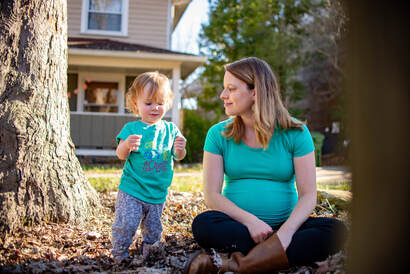 (written November 11,2019) In honor of NaNoWriMo (National Novel Writing Month), I returned to the notebooks, dusty under my nightstand, filled with the work I’d done with Peggy. In the spirit of honoring my writing, my self, and my sanity, I walked my 19 -month-old son, who had not napped for the day, a mile to the library. When his chirpy banter slowed, paces from our destination, I exhaled as I lowered his stroller seat, both of us reaching equilibrium. I wheeled us into the library and returned to pieces I’d scrawled in Uniquely Yours. Magic to return to this piece, written 8 years from the experience and now 2 years past that. Another type of magic, Green Windows’ workshops are and aren’t about the process. I know she tugged something from me with her prompt, the trust in the room and the timer. I don’t know the prompt, and it doesn’t matter. Written likely in 10 minutes, my piece sits complete. As I reread Athens, GA 2009, I inhabit the smaller clothes and forgotten shoes of the narrator. I poke open the door and wander about. It’s about the process and it’s not. I’m using a timer for this meta exercise in which I’m writing about what I wrote in Uniquely Yours, but I sit alone. As the timer slows, I’m not shifting to the new energy when we share and appreciate one another in Uniquely Yours. I’m grateful for this piece I wrote, a capsule, and for now knowing this process/not process. I know a hint of that community will see me, honor me by taking in this blog post. 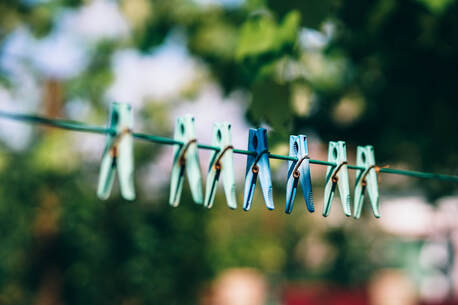 Athens, GA 2009 by Catherine Mencher (written March 9, 2017 in a Uniquely Yours monthly workshop) Head out the laundry room door, and there’s a trampoline from Craigslist. Notice the two trailers on the back right. One of them might hold a family. There’s a plastic trike on the dirt in front. There’s a rag over the window. The other one houses a glasses-wearing white man who comes by to collect Tom’s cigarette butts. Put them in a New York Times newspaper bag for him. On your left of the trampoline is a two-story house. A new dad. Talk to him about how the weather in Athens, GA has changed since he was a young kid. Remember to reject Southern stereotypes. Curve around the trampoline, notice my half-hearted DIY project: wine bottles buried in the dirt all cockananied and inconsistent. Be impressed by the strawberries Vanessa planted. Talk to the very old widow who lives in the teeny brick house next door as she hangs her thin house dresses out to dry. When she says her and her husband lived here when it was just a hill, remember. Remember the sprawling apartment complexes just a few doors down, remember the shady house with the guys who shared their coke and dressed you up just one road down, remember the public housing two stories tall just at the corner, and feel sad for her. Give her a hug. In September, we asked Green Windows participants to respond to a survey to gauge the impact of our work since we began Green Windows in 2008. The respondents exemplified the diversity of participants in our workshops:
70% of respondents participated in more than 10 workshops, with 39% attending between 11 and 50 and 31% attending more than 50. Here's what we learned from them:
THANK YOU to everyone who responded to the survey!
Check out Peggy's Creative Dialogues - you can bring her unique facilitation skills to your workplace! The monthly workshops rely on donations. Thank you for supporting this important work, if you can!! So fun! Here's what we did: We actually all wrote to the same prompt. We had several rounds and each time had volunteers read their writing to everyone, with the mic. The we switched partners. So we got to know different writers, too! 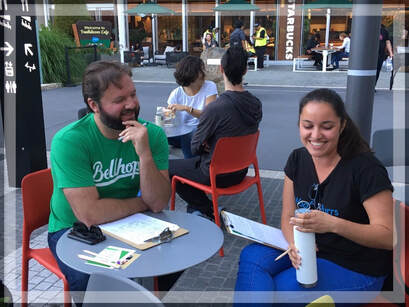 Here are some of the prompts: - calculated perforated holes - blue glow - riveted soaking trousers - overlooked misgivings As always, we were struck each time by how differently each writer responded to the same prompt! 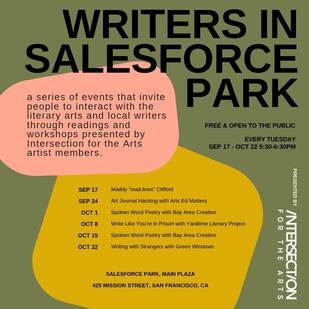 Stay tuned for more FLASH workshops!
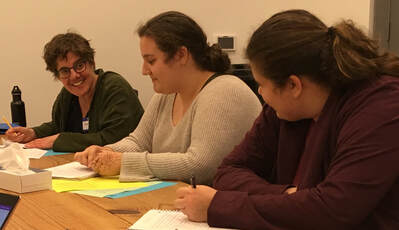 Peggy and two of the brilliant teen writers at BAMPFA, Spring 2019 Peggy and two of the brilliant teen writers at BAMPFA, Spring 2019 I love working with teenagers because I learn from them. And it's fun! I started working with teens in 1995, with the ATD Fourth World Movement in a vacation house for poor families outside of London. Teens said, "No one is working with us. Will you work with us?" I said, "Sure!" having no idea that I was making a career choice. One of those teens, Bea, and I continued to work together for several years within the youth branch of ATD Fourth World and she continued to work with teenagers well after she no longer was a teen herself. Bea and her mother, Moraene, both work as anti-poverty activists, as experts with first-hand experience of poverty. When I recently saw Moraene, at a conference in France, she introduced me to one of her colleagues: "Bea might have gone down a dangerous path if she hadn't met Peggy when she did." Youth workers often don't know the effect we really have, so that was wonderful to hear. But what was remarkable for me is that it's thanks to Bea that I've been working with teenagers, and loving it, for 24 years. Bea and I changed each other's lives, and those are my favorite stories. 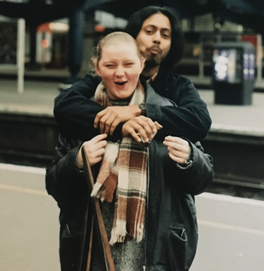 Bea and Meraz 1995 Bea and Meraz 1995 Teenaged Bea showed me around her Hackney neighborhood, told me stories about her life, introduced me to her friends, answered my questions and helped me figure out how to work with teens. She began my understanding of the struggles many teens face that I never had to face, but also of the strength, creativity and profound sense of justice that teens can bring to that struggle. After London, I spent four years working at the international center of the ATD Fourth World Youth Movement, outside of Paris. The Youth Movement brings young people from very different backgrounds together, as equals, in social justice, anti-poverty projects. I was working with young people from different countries, with different first languages, with widely varying formal education and literacy levels and facing very different kinds of challenges. There was Richard who lived with his Roma ("gypsy" or "traveller") community in a camp with no running water outside of Paris; Luke, who was going to University in Berlin who had had family on both sides of the wall; Marie who was learning circus arts to entertain children in hospitals in Brussels; and so many more. We brought them together very carefully and intentionally with a methodology that has been developed over decades and is now called Merging Knowledge. But even with this methodology and other techniques such as Theater of the Oppressed, and our purposeful facilitation, much of which I recognized later in "Restorative Justice" practices, I was consistently impressed with the capacity of these very, very different young people to overcome the barriers between them to fight for justice for all youth. That capacity gets dimmed as we grow older and I knew I had a lot to learn from it. This knowledge, of how much there is to learn from bringing very different youth together, was solidified after a group of Slovakian, French and Belgian youth I was leading on study trip in Bratislava was attacked by skinheads on a public bus. This is a story for another time, and one I have written over and over without ever being satisfied [we all have those stories]. But the most important part of the story, for me, was the incredible way the young people, who had not had an easy week, came together and supported each other in the days after the attack. In 2002, I moved back to the States, very much motivated by the desire to learn from young people in my own country like I had been learning from youth in Europe. While waiting in France for visas to come through for my French husband whom I had met in the Youth Movement, I put together a data base of youth-serving organizations in the San Francisco Bay Area. When we finally settled in San Francisco, we both found very interesting jobs in youth organizations and we were both shocked by how youth from "disadvantaged" backgrounds were being treated. The bar was consistently being lowered for them. Staff were condescending and preachy. And no one seemed interested in learning from the youth themselves. We had been trained to keep the bar high for all youth, knowing every youth would need different kinds of support to get there. We'd learned to be patient and persistent, creative and team-focused. Most importantly, we'd learned to listen to the youth themselves, as the experts on their own lives. My (now-ex) husband (and still best friend) eventually gave up on American non-profits which are overly guided by grant cycles and which put so much financial investment into executives who, especially at that time, seemed so far away from the lives of the youth they were meant to be serving. 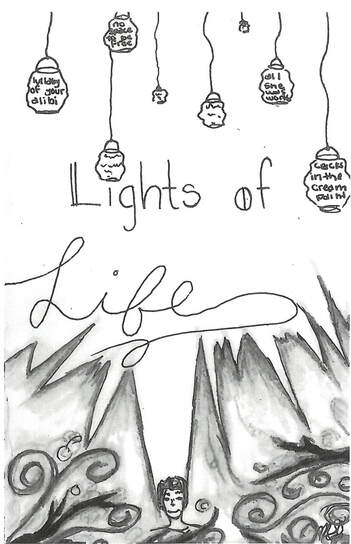 Teens made a zine at the end of the workshops at Berkeley Public Library, Summer 2019 Teens made a zine at the end of the workshops at Berkeley Public Library, Summer 2019 Eventually I found two organizations and one new methodology that would allow me to work with youth in a way I believed in outside ATD Fourth World: The Beat Within, The Oakland Public Library, and the Amherst Writers and Artists (AWA) writing workshop method. I've been volunteering with The Beat for eleven years in the local juvenile hall, and for the last year in San Quentin State Prison. The purpose of The Beat is to get the experience, thoughts and creativity of youth, especially incarcerated youth, out into the world through writing workshops and a magazine. The public library, for which I've worked, mostly part-time, for over ten years, is all about seeing the full complete person in front of you, finding answers to their questions, and being a gateway to knowledge sources and community they might not find elsewhere. The AWA method sees every person as a creative person and sees brilliance as being rooted in one being true to oneself. I've been using AWA in Green Windows workshops since 2008. Through all these jobs, bits and pieces of work cobbled together to almost make a living in the Bay Area, I have learned a lot from young people in my community. The boys killed on the street in the "bad" parts of my town (parts I live and work in, happily) aren't just boys, they are our boys. I know the shooters and the shot and know choices they face and choices they do not have. Thanks to The Beat, I know a lot of their hopes and loves and dreams and I've seen those turn to despair when their future is no longer imaginable. I bring these hopes and these despairs into everything I do and they make up one basis of my understanding of my community. I am not the same person when, for example, on the same day, I hear news that a 24 year old I've known since he was 15 got his sentenced reduced from 84-years-to-life to 2 more years in the state juvenile facility and news that another, age 19, a youth worker himself, was shot and killed sitting in his car with his girlfriend. I don't want to not know this. I want to know these young people and I want all my decisions to be affected by these events, these youth, these victories and these losses. Thanks to working with the Oakland Youth Poet Laureate program for the library, I get to listen to youth speak out on race, gender and justice in ways that my generation cannot manage with such articulation and honesty and respect. And being able to witness teen writers support each other in Green Windows workshops has taught me about listening, about imagination, and about what being true to oneself means today in ways that deepen my trust in the future of our society, if these youth can continue to be themselves and be safe. Today's youth give me hope. Not because they are simply the future, nor because of their own hope. Youth give me hope because they are brilliant, because I can see social progress made within them, because I have so much to learn from them, which means my own life is still evolving. We need to support them, trust them, believe in them, but not step back, not give over. As an adult, I want to continue to listen, to learn and to then see how I, with the wisdom and skills I've gained over fifty years, can help. Let me know if you, too, want to help. And I truly do simply enjoy the company of teenagers. And I am deeply grateful to be doing work I love. - Peggy Simmons PS -if the skills and experience I've gained working with teens over the years could be of use to your group - of adult or youth - please let me know! 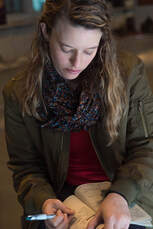 Catherine Mencher, Administrative and Operations Consultant, has been writing in Green Windows workshops for years. She has recently begun using her admin and operations skills a few hours per week to help Green Windows through this period of transition and growth. She's immediately become indispensable. Thank you, Cat! We asked her to share a little about her relationship with Green Windows as well as the powerful piece she wrote in the June Uniquely Yours workshop. Why do I support Green Windows: Art of Interchange? I hope to provide the Green Windows: Art of Interchange community with a drop of what it has given me – deep connections to folks with whom the daily rhythms of my life would not otherwise come into unison, a reconnection to how I cast myself as a child (as a writer) and a model for how to comprehend the world. Spaces like Green Windows are elusive in our face-in-screen society. How we participants write in Green Windows reveals and validates how we live. Some follow prompts with extreme fidelity, some throw them aside. By accepting the diversity in writing approach that others take, we see and honor their uniqueness, and in turn our own innate uniqueness. Green Windows inspires an authentic day-to-day curiosity, a wondering what each person we come into contact with would say if given a pen and paper and brought to our circle. In my new role, what will I do for Green Windows: Art of Interchange? I hope to increase the chances that someone comes into contact with the various offerings of Green Windows. The social media world can be a scary one, but I want to ensure Green Windows has a presence that increases the connections and long-term viability for its important work. I want to push the wheels on the grinding details, like data-keeping and grant-satisfying, so that Peggy can move the integral product, authentic connection and community-building, forward.  Lines by Catherine Mencher I didn’t like the aftermath. Jaw like sandpaper had scratched the bones and bases of the teeth. Memory of the lack of control, the learning that one tab of one finely hewed chemical could drop my inhibitions so totally. I didn’t like looking back at standing jittery in the line at Walgreens buying bottles of lotion. I kept that knock off lotion for almost a decade. Finally throwing it away before I finished it. One bottle of aloe still haunts my toiletry drawer. Knowing how thin our line of control is. I didn’t like what the chemicals in my mind had gotten me into the night before. I do love hearing you in the morning. I so never want it to end. As I sit today I want to keep making babies so I can always hear MOM in the morning. I’m grateful I don’t have a six am shift. How easy it would be for our disconnect to build if I couldn’t hold you every morning, couldn’t be in a privileged group who know what you look like when you fall back to sleep: the adorably adult way you reach your arms up to yawn, trying to push yourself back under that cloak of sleep when the light’s teasing the outside. I learned that I love strawberry cake when Jacob and Newton married. At some point the cake splat onto the grill at the wedding park. Erich, I love that you and a couple named Elizabeth and Maegan ate grill cake together and that we bonded about it in the bathroom line later. I don’t like the word usurp. It seems like a word describing something that I tend to support happening, but it has a sneaky, gnarly feel to it, like something done the less ingenuous way. I don’t like a lot of things anymore. I don’t like what it feels like when a baby throws rice all over the floor, which sticks flatly to your feet, requiring a peel off. I don’t like that caring for my child has made me bad at modeling austerity. How do I keep him hungry enough so he doesn’t waste food is not a question I ask myself much. I do like the concept of personal change. I’m frustrated by the litmus test put on people in power. Why are they held accountable to not changing? Isn’t changing what makes a human? 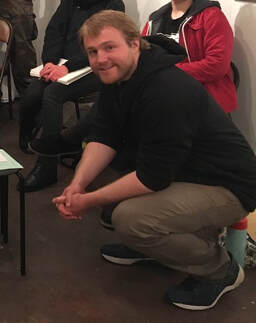 How can I combine my passion for the issues of education equity, prison abolition and youth solidarity in one poem written in one thirteen-minute sitting? If you had asked me before 7pm Sunday night I wouldn’t have been able to tell you, but as the sky changed hues we all straggled into a warehouse in North Oakland and sat down in semi-comfortable chairs for the Uniquely Yours workshop. We opened our notebooks and Peggy started feeding us prompts. A few new folks but most of us veterans of this workshop, coming almost every month and forming close-knit bonds around shared expression. I had something on the tip of my tongue but I couldn’t taste it, couldn’t form it into the words that I wanted. My muse felt like an astronaut suspended in deep space with nothing to hold on to. Then Peggy read the poem “Purple” by Alex Rotella and gave us the prompt, “Write about a moment when you were discouraged, or encouraged, or when you discouraged or encouraged somebody.” In this workshop it is assumed that everything we’re writing is fiction, even if it’s not. This gives us the freedom to write the truth while maintaining anonymity in our own experience. In other writing workshops I will write a piece and people will ask me about it as if the narrator is really me, Alec West, in real life, and the story I wrote was something that happened to me. Outside of Green Windows, I have to stop people and say, “This story is not about me.” I don’t want what I say in a story or a poem to affect the relationships I have with my friends, my family, my readers, or the community at large. Outside of Green Windows, this happens whether I like it or not, but within the safe space that we all create together, I can write whatever I want, plumbing the pits of my soul for something I would never admit to my closest friend. When I share those secrets with the people around me through my writing, they nod and listen and tell me what they liked about it, then we move on. It never has to enter the relationships I form with those people outside of the workshop and it never leaves the room. With the safety afforded by Green Windows I can write freely and do the kind of self-exploratory work I need to do among others in my community who are doing the same thing. I wrote this piece that night, based on that prompt. I thought about how discouraging it is for a teacher to have one of your students, someone much younger than you, die. I’m not revealing whether I’ve had that experience or not, but you can judge whether my writing resonates with you, and you can feel it if it is authentic. 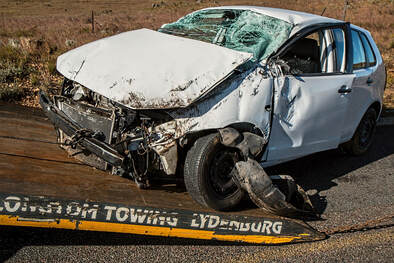 To Be Judged by Alec West At twenty-four I was young to be a teacher whose student had died. Ricardo had what you would call a magnetic personality. He was tall and solid with long hair that descended to his shoulders like the coned branches of a pine tree. He wore the jail uniform like any piece of clothing you would wear. He seemed to have an air of acceptance of where he was and hope for where he was going. Both of these combined with patience, faith that he would get there, that took confidence. I only remember him really writing one piece in all of the writing workshops we had. He attended a lot of them, as he was in jail for six months after I got there and I don’t know how long he was in before. Press play. Three months after he got out, a car crash. Ricardo was a passenger and he was dead. I’m not sure if he was 18 yet or not. I wrote in his obituary: “Almost as sad as his young death was how long he had to spend in jail.” Overall, Ricardo spent two and a half years in jail after he skipped out on probation to get a job so that he could support his family. A vast number of the people you will meet in jail are not there for their original crime, but for a violation such as staying out too late, or not checking in with their PO, things that are not illegal but could wind them back up in the system. Often these people are leading positive, productive lives and trying their best, but one misstep led them off track. How many people are lost to parole violations, not even real crimes? How many are trapped behind walls when they could be connecting or creating with us? What if you were judged and your whole life was determined by what you did or what happened on your worst day? There is a scene in the movie, “The Mustang” when a therapist asks a group of prisoners incarcerated for violent crimes, “How long from the idea of the crime to the committing of the crime?” 30 seconds. Fifteen seconds. Ten seconds. Less than half a second. The men answer with certainty as though a game show is asking them what they had for breakfast. Can you judge the entire character of a person for an action committed without making a decision? Do you feel safe? I’m young in my teaching and I’ve only had one student die. I’ve known teachers who have lived through the deaths of several of their students. The loss we feel is mixed with blinding injustice as the world becomes a little less colorful, a little less vibrant, and we all become a little less powerful, despite the efforts we as teachers put out every day to keep the fire burning in our students’ hearts. Our students get snuffed out. We put our dreams into these children, and these children give hope back to us. Then, the system takes these children, takes them away from the rest of us. I am a teacher and I am in my twenties and I’ve had a student die. You can judge whether I am too young or whether this is too much, but this is the world we live in. I’m not ready to make a judgment about the world, and Ricardo will always remain perfect in my memory. Do you feel safe? Alec West is a teacher, activist, and author of What Happened When I Stopped Watching TV, his first book, available on Amazon. He lives in Oakland, but is moving to Richmond, and was born and raised in the East Bay. You can find him on Facebook: on instagram @alecwestwriter510, or writing in a local cafe.
Our blogger this month, Roxanne Rocksteady Jones, first attended a Green Windows writing workshop in 2010 and has consistently written with us at every opportunity since. We asked her why she keeps coming back. 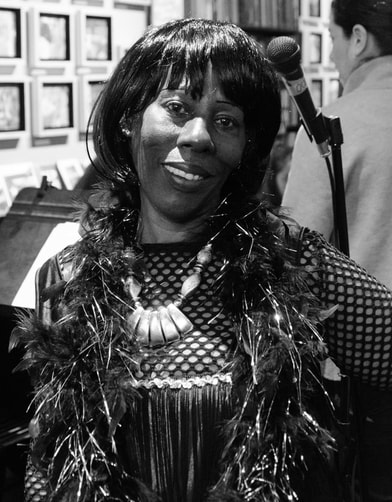 Roxanne at the Green Windows ten year anniversary reading. Roxanne at the Green Windows ten year anniversary reading. I keep coming back to Green Windows because I really got motivated when Peggy first invited me to the class to get over past things and express myself more. While I was taking the class, I went to a women's group and we had incense and candles and meditated and were asked to take whatever was on our mind and bothering us, from childhood to early age to teen to young adult to adult, and write it on a piece of paper, then read it to ourselves, then ball it up. It made me get rid of what was bothering me. I had been feeling like I had been tortured since a little girl. But as I wrote, I released things through the tears in my eyes, from my stomach, my belly, to my lungs to my throat, releasing it, throwing it up, freeing myself. So my writing is more like a journal: Instead of using my voice, I'm using my writing, screaming so the world can hear me. Instead of marching in the streets with the 99 women's march, I'm the 100th woman, marching with words. Young women, girls and teens are speaking up with their voices. You know, some people can't speak. Some people can't hear or talk. But they can read with their eyes. Reading, and other people reading your poetry or stories, is inspiring in either a happy way or sad way. They can learn to relieve what is bothering them, too. Now I'll hand a person a pencil, ink pen, or crayon and say, "I would like to hear your story. Would you like to write it down?" People think homeless people want money or food. Some people just want people to hear their story, to sit and listen, or release something, or just be quiet together. So asking them to tell their story, what's bothering them, they are like. “Oh, I just wanted you to hear this." Sometimes it doesn't make sense, but I don't care. They just want someone to listen. Most people don’t have time. For 2019 I would like for the city of Oakland or Green Windows to have an open mic where women, men too, but women, can say what's on their mind or what they went through, or what they want to release. Then we can give each other hugs after and let each other know we are loved no matter what gender, race, color or nationality. When I think about the violence done to people of color and queer people, I want say, “No matter your gender, we are praying for you, be strong, keep your heads up, know that you are loved. I hope they catch the racist haters out there who try to torture you. We are going to kill them with love because love is what makes the world go around.” Below is a piece of writing that I wrote in a Green Windows workshop. It was published in the 10-year anthology, Writing from Green Windows. Who’s Your Daddy?
By Sister Roxanne Rocksteady Jones Trick or Treats Mamas’ babies daddies’ maybies Who’s your daddy? Ok! Soul Sisters Girls, here we go Dancin’ to the beat of Aretha Franklin and Lady of Soul, Diana Ross and Lady Sings the Blues Here near downtown Oakland the block of 22nd, Telegraph and West Grand Ave which is now called Uptown Here on the sparklin’ psychedelic rainbow dance floor in this ol’ ol’ ol’ red brick building used to be the Pancake House which is now called Disco City Shakin’ our money maker as the mens would say Shakin’ what your Mama gave you Shakin’ our bootays Droppin’ it like it’s hot Girls just wanna have fun Actin’ like our Mamas’ drinkin’ brandy Courvoisier Vodka with pineapple juice and Gin Strawberry margaritas Laughin’ havin’ fun Cryin’ talkin’ about the good good ol’ days about the no good men who almost stole our hearts Rememberin’ the good good good ol’ ol’ ol’ days When our Mamas was also on the dance floor Partyin’ and shakin’ their old money makers Their groove things Their asses, as the ol’ men would say Drinkin’ brandy with milk 7 Up with Courvoisier Vodka with orange juice Gin with apple juice Dancin’ to the Temptations the Whispers Gladys Knight and the Pimps Dancin’ til’ the funkadelics the freaks Come out at night Dance song Shakin’ it Droppin’ it like it’s hot and our Moms cryin’ about our no good daddies on the dance floor as the Godfather of Soul, James Brown Sings the number one song Hot Pants I like the girl with the hot pants on She can do the boogie woogie all night long Oh my God, he’s singin’ about my Mama who’s your daddy? James Brown, Father of Soul Goin’ back to the good good good ol’ days Trick or Treat Who’s your daddy? Mamas’ babies daddies’ maybies 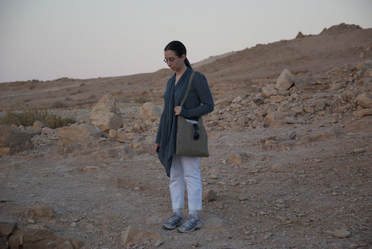 When I was a teenager, I was very ambitious. I was convinced that the stories coalescing in my head were so vivid and important that I would make a great working writer, sell enough copies to support myself, maybe have my works taught in English classes, and follow in three of my relatives’ footsteps. What I didn’t fully understand, however, is that being a working writer requires a day job—or in my case two—especially if you’re publishing books by yourself. The major traditional publishing companies were, and sadly still are, the gatekeepers of literature, and generally wary of investing too heavily in unproven writers, which is why I was so determined to do it myself. In college, I intended to collect my rejection letters to remind myself not to give up. Unfortunately, some time after my sixth rejection, I had a serious health emergency, then life caught up with me, and I misplaced my collection. But at least I never stopped reading, or watching movies, or listening to music, and finding things in life that inspired me, because those experiences help maintain the vibrancy of my stories, and even to help ground them in reality, to make more sense of them. Even generative writing programs like Green Windows have been invaluable. As Kurt Vonnegut Jr. once wrote, “The arts are not a way to make a living. They are a very human way of making life more bearable.” Nobody can really tell you how to write (no matter how much they might want to), because the creative process is an extension of your unique, individual thoughts, feelings and ideal method of expression. When we write, that process is the crystallization of concepts that we wish to transmit, however raw they might be at first. Editing is the process of cutting, refining and burnishing those ideas like gemstones. When we read, watch or experience other things, we are mining … looking for the things that resonate with our own experience. In summation, we need to look for the things that inspire us, and we will know that they’ve inspired us when, all of a sudden, in spite of whatever obstacles that external forces throw in our way, our world-views and the stories connected to them begin to make sense again. Below is a piece from a previous Green Windows workshop. Enjoy! Excerpt from
“THE HEARTSCAPE FACTS” THREADS ON WWW.MAPPINGTHEHEARTSCAPE.COM, DATED 07/29/2011 by Rachel Golden FACT It has long been believed that Atlas Galt, the keytarist for Heartscape, was named after the Greco-Roman god who supposedly held up the Earth on his shoulders. Whoever first started that bull-crap was clearly an Objectivist twat, because any fourth-grade textbook will tell you that Atlas was the Greco-Roman god who held up the SKY on his shoulders, which was no doubt an easier job because the sky is way lighter! RighteousPath: LOL! Howitzer: LOL! VMyson: LOL! PantherHands: OMG LOL! RocketSauce: FUCK OBJECTIVISM UP ITS FAT WRINKLY ASS!!!!! Diogenes: LOL nice one, Rocket! RighteousPath: Damn, that got political pretty fucking quick. BigNo: Not even the internet is totally free of politics, sadly. Up north, we have a contemptuous asshat named Stephen Harper to thank for that. Part of me is tempted to go scale Mount Everest for that very reason. Howitzer: Fuck Stephen Harper! LunarRover: Wait a goddamn minute… I think I know the smart-ass piece of shit who wrote this post in the first place. BigNo: Do you, now? LunarRover: I’d accuse Biggie, but that’d be too easy, and frankly he’s not one with an affinity for Greco-Roman gods. Diogenes the dog, I accuse you! Do you hear me? J’accuse! Diogenes: Ruh-roh! Guilty as charged. SidPernicious: LOL! LunarRover: More like “guilty as fuck”! VMyson: Bad dog. No biscuit. LOL. Diogenes: LOL! Howitzer: Holy shit, I love this fucking forum so much! LunarRover: And the forum loves you, too, Howie. SidPernicious: I don’t love Howie, gaymo. VMyson: That’s because you’re an asshole, Sid. BigNo: LOL! RighteousPath: LOL! Howitzer: LOL TRUE DAT! SidPernicious: I’d rather be an asshole than a gaymo, like you gaymos! Diogenes: Aw, sorry to hear you’re not comfortable with your sexuality, Sid. You might want to get in touch with someone at PFLAG, and maybe get some shit off of your chest. SidPernicious: Why the fuck would I do that, when I have you chodes to get into bitch-fights with? BigNo: I think what my associate meant is that you should do yourself a favor and “get some santorum off your chest,” Sid, because I’m pretty sure I can smell it from here. RocketSauce: Yeah, Sid, it’s not our fault you’re so deep in the closet, you’re finding Christmas presents! PantherHands: ROFLMAO! LunarRover: ROFLMAO! RighteousPath: Embrace your queerness, Sid! We believe in you! Howitzer: LOL! PantherHands: LOL! VMyson: OMG I’M DYING! SidPernicious: FUCK YOU PUSSIES! SidPernicious has logged out. VMyson: LOL what a dumb-ass! Howitzer: Some motherfuckers just don’t have the introspection to be able to laugh at themselves. LunarRover: Wait a sec, do kids these days still say “gaymo” when they want to insult people on the internet? Seriously? Diogenes: I know, right? It’s so last decade… BigNo: Kids are so unfashionable. 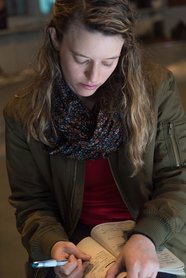 Green Windows has recast how I see myself. Yes, I am a writer. Yes, I have a community to draw from. Yes, my words have a place. - Catherine 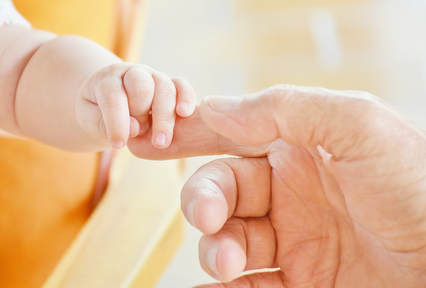 You like me best when it's cold out. Something sexy about more clothes over less. That gray shirt with your coiled strength below it: that thin barrier smooth against my pushing shoulder blades. You like me best, but you love him most. "He's my best friend, mama." He likes me best when he's giggly. It turns out that the most base human state is polarity. Within ten minutes, gleeful hee hees and ha has, wailful mourns and utter ambivalence. |
Categories
All
Archives
July 2020
|
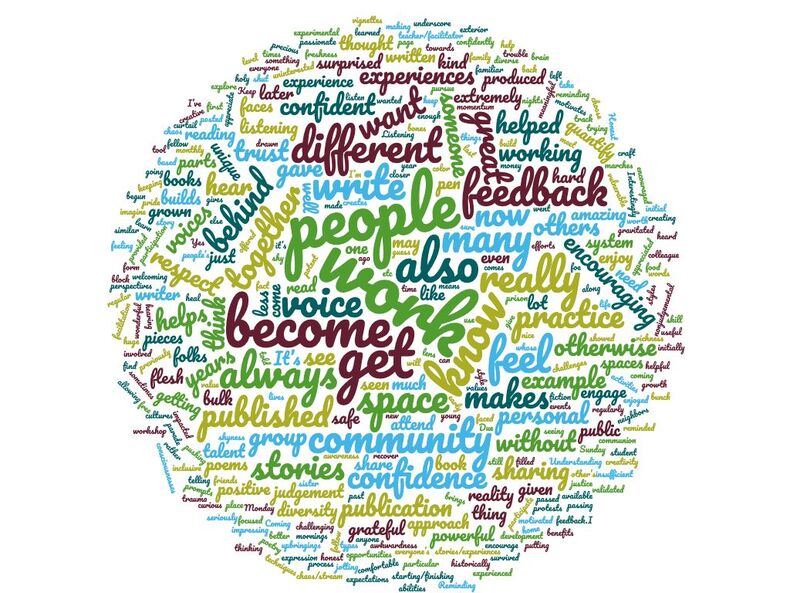
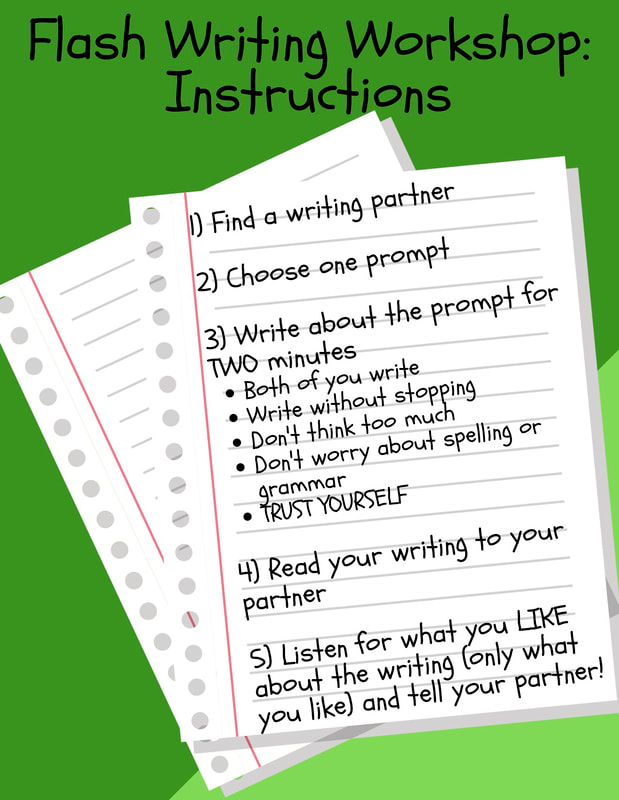
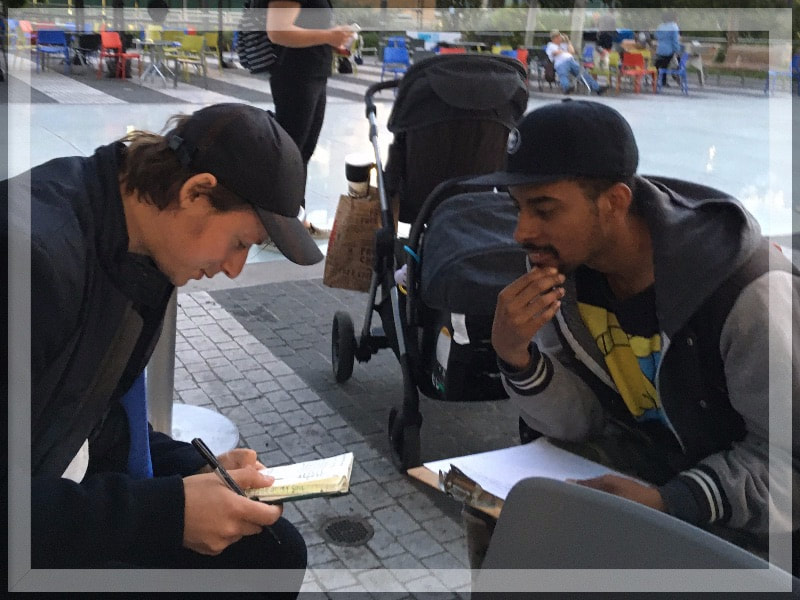
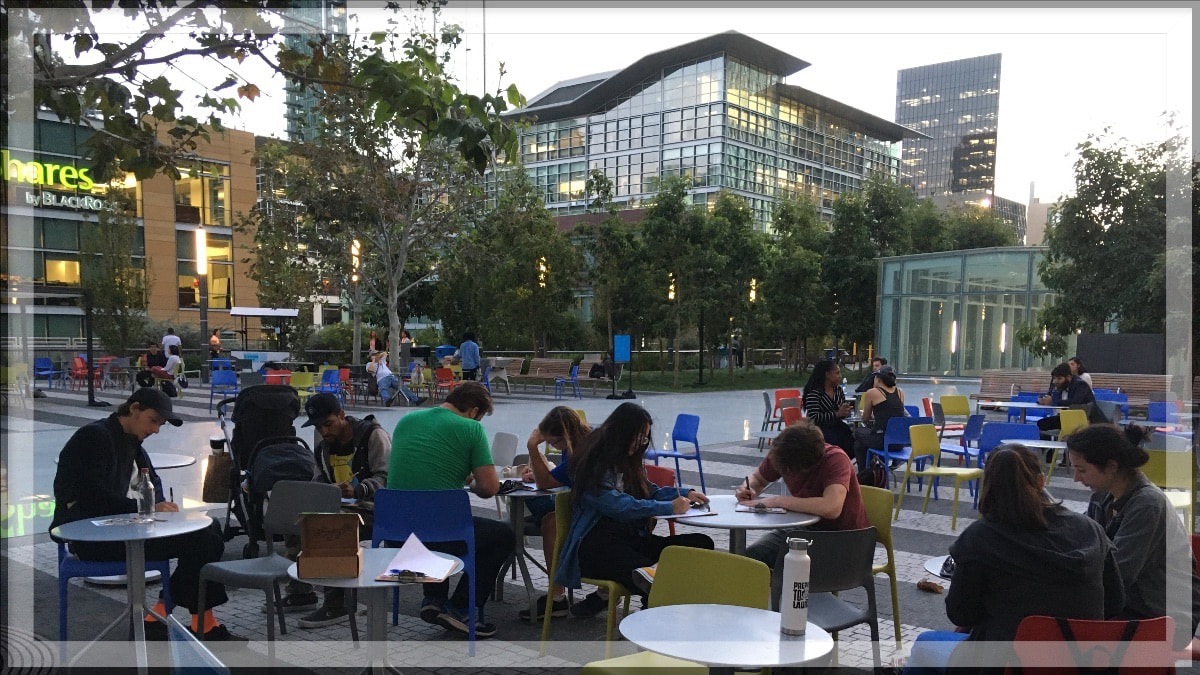


 RSS Feed
RSS Feed
